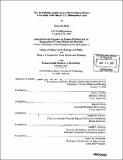The air pollution implications of the residential sector : case study of the Mexico City Metropolitan Area
Author(s)
Roth, Kellyn E. (Kellyn Elizabeth), 1975-
DownloadFull printable version (12.69Mb)
Other Contributors
Massachusetts Institute of Technology. Dept. of Urban Studies and Planning.
Advisor
Mario J. Molina, Diane E. Davis and Stephen R. Connors.
Terms of use
Metadata
Show full item recordAbstract
The residential sector has been a long-acknowledged, but seldom-addressed, source of air pollution in the Mexico City Metropolitan Area (MCMA). The combination of high emission levels and large numbers of people directly exposed means that the indoor environment is a unique situation. If current trends of demographic growth, urbanization and increased appliance saturation continue, the urgency to address residential sector emissions will increase considerably. Additionally, households have wide-reaching impacts on many sectors including industry through the demand for appliances, power generation and fuel suppliers through the demand for energy, services through the demand for infrastructure, and many more. Through recent efforts, researchers at MIT and in Mexico have attempted to understand and represent the residential sector, to identify and mitigate emissions release and exposure, most of which is energy-related. To reduce energy consumption, and thus emissions, in the home several strategies have been considered: reduced and improved use of fuel; increased energy efficiency; fuel leakage prevention and improved practices; improved building efficiency; and improved fuel transmission and delivery. Another issue of concern in this sector is the use of toxic solvents. Household air pollution reduction strategy outcomes are difficult to predict because of the diversity of households (e.g., size, income, location) within the residential sector. Determination of the factors that affect energy consumption and household behavior would be very useful to decision makers as they develop more targeted policies for the provision of energy services and reduction of household-generated emissions.
Description
Thesis (S.M.)--Massachusetts Institute of Technology, Engineering Systems Division, Technology and Policy Program; and, Thesis (S.M.)--Massachusetts Institute of Technology, Dept. of Urban Studies and Planning, 2003. Includes bibliographical references (p. 121-131).
Date issued
2003Department
Massachusetts Institute of Technology. Department of Urban Studies and Planning; Massachusetts Institute of Technology. Engineering Systems Division; Technology and Policy ProgramPublisher
Massachusetts Institute of Technology
Keywords
Technology and Policy Program., Urban Studies and Planning.